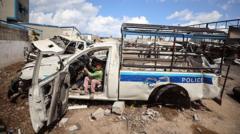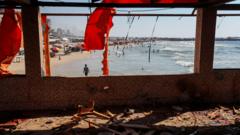**As diplomatic efforts unfold, both sides show commitment to reaching a cease-fire amid an increasingly tense situation in Gaza.**
**Negotiations in Qatar Raise Hopes for Israel-Hamas Cease-fire**

**Negotiations in Qatar Raise Hopes for Israel-Hamas Cease-fire**
**Ongoing discussions in Doha between Israel and Hamas signal potential for a peace agreement despite challenges.**
In a series of high-stakes negotiations taking place in Qatar's capital, Doha, representatives from both Israel and Hamas are exploring the potential for a cease-fire in Gaza. While the discussions have not yet yielded a concrete agreement, the continuous presence of mediators signifies both parties are earnestly engaged in the dialogue.
Optimism from officials, including those from the Trump administration, contrasts with the current lack of a breakthrough. The negotiation format employs indirect talks, with representatives from each side situated in separate locations, transmitting messages through mediators, as stated by a diplomat familiar with the situation, who requested anonymity to speak on sensitive diplomatic matters.
Qatari foreign ministry spokesman Majed al-Ansari emphasized the importance of the ongoing discussions, though he refrained from making any premature conclusions about their progress. The focus of the current talks involves constructing an initial 60-day cease-fire agreement paired with the possibility of releasing hostages held by Hamas. If established, these discussions would pave the way for further negotiations aimed at resolving the overarching conflict on the first day of the cease-fire.
Israel's negotiating team comprises military officials and advisers, including representatives from Shin Bet and Mossad, while Hamas's discussions are led by Khalil al-Hayya, a prominent figure within the group with a history in coordinating significant Hamas activities. Al-Hayya's pivotal role highlights the intertwined leadership dynamics as negotiations proceed, particularly given his connections to military operations and intelligence within the organization.
The diplomatic activity echoes previous efforts after past conflicts, where intense discussions often extended deep into the night, reflecting the complex interplay between conflict resolution and the geopolitical complexities of Israeli-Palestinian relations.
As the world watches these developments, the prospect of a cease-fire remains uncertain, yet the commitment from both sides marks a critical moment in the ongoing dialogue to quell hostilities and provide a semblance of stability.
Optimism from officials, including those from the Trump administration, contrasts with the current lack of a breakthrough. The negotiation format employs indirect talks, with representatives from each side situated in separate locations, transmitting messages through mediators, as stated by a diplomat familiar with the situation, who requested anonymity to speak on sensitive diplomatic matters.
Qatari foreign ministry spokesman Majed al-Ansari emphasized the importance of the ongoing discussions, though he refrained from making any premature conclusions about their progress. The focus of the current talks involves constructing an initial 60-day cease-fire agreement paired with the possibility of releasing hostages held by Hamas. If established, these discussions would pave the way for further negotiations aimed at resolving the overarching conflict on the first day of the cease-fire.
Israel's negotiating team comprises military officials and advisers, including representatives from Shin Bet and Mossad, while Hamas's discussions are led by Khalil al-Hayya, a prominent figure within the group with a history in coordinating significant Hamas activities. Al-Hayya's pivotal role highlights the intertwined leadership dynamics as negotiations proceed, particularly given his connections to military operations and intelligence within the organization.
The diplomatic activity echoes previous efforts after past conflicts, where intense discussions often extended deep into the night, reflecting the complex interplay between conflict resolution and the geopolitical complexities of Israeli-Palestinian relations.
As the world watches these developments, the prospect of a cease-fire remains uncertain, yet the commitment from both sides marks a critical moment in the ongoing dialogue to quell hostilities and provide a semblance of stability.






















